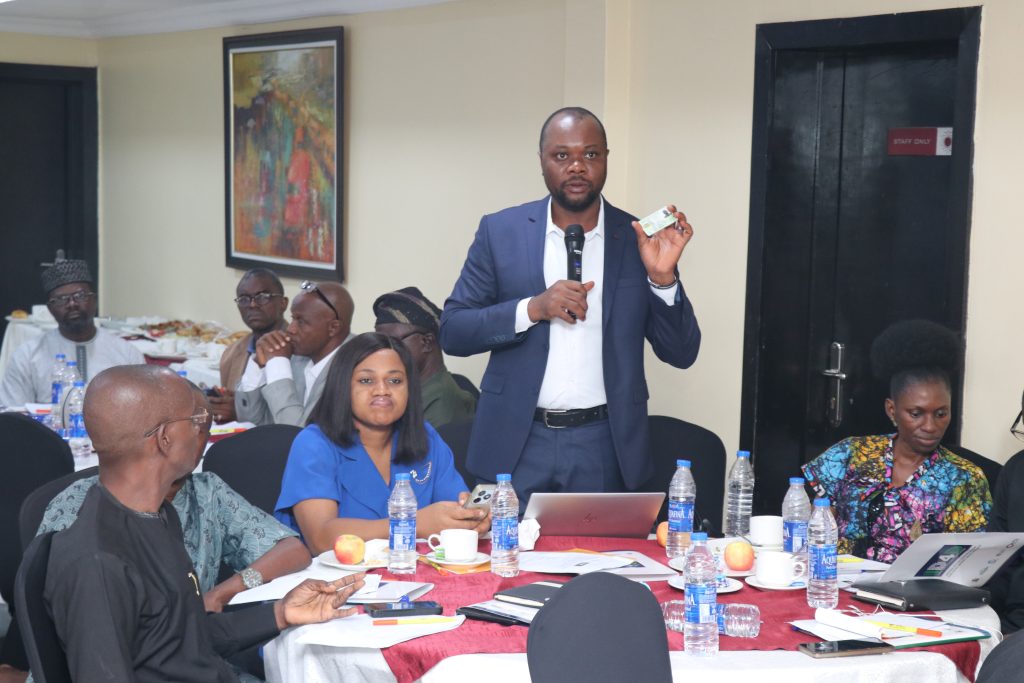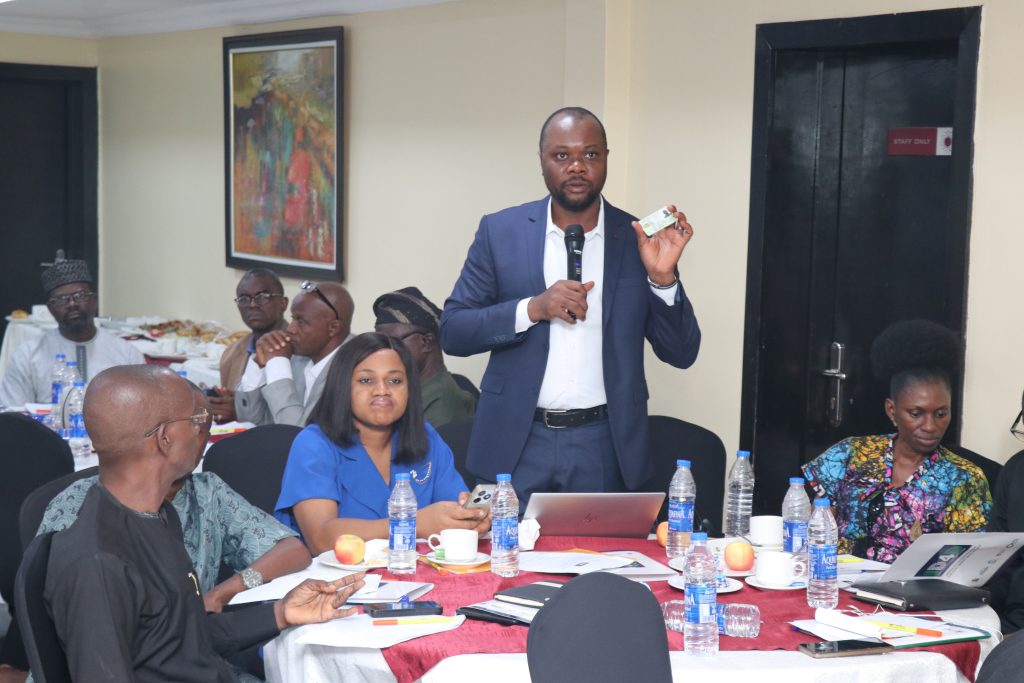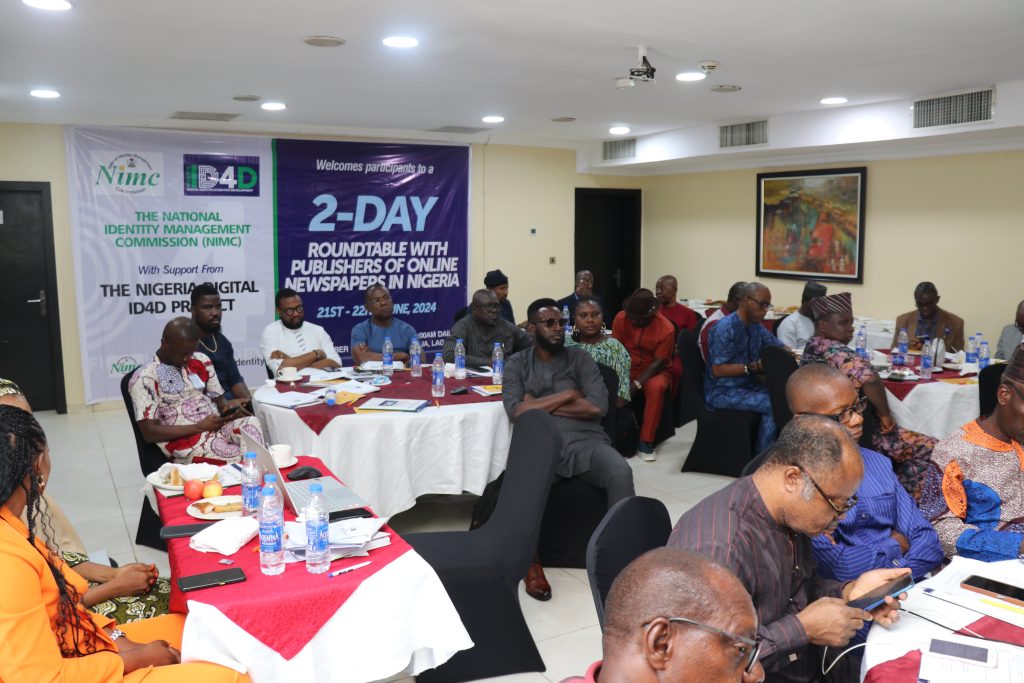Opinion
NIMC, Online Publishers Roundtable: Implications and Future Directions
NIMC, Online Publishers Roundtable: Implications and Future Directions
By Walter Duru, Ph.D
The digital age has reshaped how we consume and disseminate information, with online media playing a crucial role in shaping public perception and opinion.


Recognizing this, the National Identity Management Commission (NIMC), with support from the Nigeria Digital Identification for Development (ID4D) Project, recently organized a two-day roundtable with online newspaper publishers in Nigeria.
The Roundtable, held in two batches, at Lagos and Abuja, respectively, provided participants the opportunity to understand and appreciate the activities, strategy, approach, achievements, and challenges of NIMC. It was the first of its kind, since the establishment of the commission.
This collaborative initiative underscores the importance of dialogue between regulatory bodies and media stakeholders in shaping the future of identity management in the country. It marks a significant step toward enhancing communication, collaboration, and mutual understanding between NIMC and digital media stakeholders.
The roundtable, themed “Building Trust and Collaboration in the Digital Age: Enhancing Communication Between NIMC and Online Publishers,” aimed to bridge the gap between NIMC and the digital media.
It provided an opportunity for NIMC to articulate its mandate, vision, activities, and achievements directly to the publishers while addressing some misconceptions surrounding its operations. The roundtable laid the foundation for future interactions and collaborative efforts.
The event was also designed to foster a partnership that leverages the strengths of online media to support NIMC’s mission and to ensure accurate dissemination of information.
In her opening remarks at the event, NIMC Director General and Chief Executive Officer, Engr. Abisoye Coker-Odusote emphasized the importance of building strong relationships with the media to combat misinformation and to enhance the visibility of NIMC’s efforts.
“As we gather here today, we are united by a common goal: to build formidable bridges between the National Identity Management Commission (NIMC) and the influential voices of the online media landscape.”

“In the digital age, the influence of online media cannot be overstated. The internet has become a primary source of information for many, particularly the youth. However, it is also a breeding ground for misinformation and rumours, which can severely impact the reputation and trust in organizations.”
“Our focus today is to address the dual role of online publishers – as key partners in disseminating accurate information and as potential sources of misconceptions. We recognize that while you have the power to amplify our successes, there is also the potential for misunderstandings that can spread rapidly.”
“This Roundtable aims to forge a partnership that leverages your strengths to support our mission while ensuring that any misconceptions are promptly and accurately addressed.”
“Pursuant to our commitment to transparency and accountability, we have instituted robust mechanisms for participation, grievance redress, and regular monitoring to enhance operational performance and mitigate social risks.”
“Let me also use this medium to remind you all that enrolment for the National Identification Number (NIN) is free of charge in Nigeria.”
“Taking advantage of this meeting, we hope to provide you with comprehensive insights into NIMC’s activities, objectives, strategies, achievements, and challenges. This knowledge is vital for you to disseminate accurate information to the public.”
“It is also expected that we discuss your roles in the forthcoming NIMC Ecosystem Enrolment exercise, ensuring you understand how you can contribute to this national effort.”
“Let me use this medium to, once again, reassure Nigerians, at home, and in the diaspora that robust measures are in place to safeguard the nation’s database from cyber threats. Under my leadership, NIMC has an unwavering commitment to upholding ethical standards in data protection. Cutting-edge cybersecurity technologies are in place to protect the database.”
Earlier in her remarks, Coordinator, Project Implementation Unit, Nigeria Digital ID4D Project, Tito Ejenavi, highlighted the project’s development objective – to increase the number of persons with a National Identity Number (NIN) through a robust and inclusive foundational identity system.
“By strengthening our national identity infrastructure, we aim to bolster Nigeria’s digital economy, enhance data protection, and close the inclusion gaps that hinder access to identification and related key services,” she explained.
Also, in his remarks, Deputy President, Guild of Corporate Online Publishers (GOCOP) and Publisher of NewsdiaryOnline, Danlami Nmodu, pledged the continued support and collaboration of online publishers to the commission.
The roundtable featured a series of presentations, interactive sessions, and case studies, aimed at educating participants about NIMC’s operations, strategy, achievements, and plans.
Notable presentations included “NIMC: Mandate, Approach, Operations and Strategy” by Festus Esangbedo and “Understanding Engr. Abisoye Coker-Odusote’s 5-Point Agenda for NIMC” by Dr. Alvan Ikoku.
Others are: “Front End Partners in NIN Enrolment: Essence, Approach, Benefits and Challenges”, by Carolyne Folami; “Nigeria Digital ID4D Project and the Ecosystem Enrolment”, by Chinenye Chizea’; “Improvements to NIMC Infrastructure: Implications to Data Integrity, Privacy and Security”, by Chinenye Chizea, and “Online Publishers and Realization of the NIMC Mandate”, By Dr. Walter Duru.
These sessions provided comprehensive insights into the commission’s efforts to maintain a secure, robust and inclusive national identity system.
For online publishers, the roundtable underscored the importance of their role in the national identity management ecosystem. As digital gatekeepers, they have the power to shape narratives and influence public perceptions. The collaboration with NIMC presents an opportunity to enhance their reporting with accurate and comprehensive information directly from the source.
The NIMC’s engagement with online publishers is a strategic move to enhance transparency and build public trust in the National Identity Number (NIN) system. By involving the media, NIMC can ensure accurate and timely dissemination of information, addressing public concerns and misinformation about the digital identity process.
The roundtable provided an opportunity for NIMC to clarify its objectives, challenges, and progress. Online publishers, armed with this knowledge, can produce more informed and insightful content, fostering a more supportive and educated public opinion. This improved understanding can lead to more nuanced reporting, highlighting the benefits and addressing the drawbacks of the NIN system.
As the media amplify the discussions from the roundtable, the general populace stands to benefit from increased awareness about the importance of digital identity. This awareness is crucial for driving the widespread adoption of the NIN, which is essential for the success of various government initiatives aimed at improving service delivery and socio-economic development.
Feedback from online publishers provided NIMC with valuable insights into public sentiment and practical challenges faced by citizens. This collaborative feedback loop can inform policy adjustments and operational improvements, ensuring that the NIN system evolves to meet the needs and expectations of Nigerians effectively.
The outcomes of the roundtable were promising, with enhanced understanding of NIMC’s mandate and activities, strengthened relationships, and the establishment of effective communication bridges between NIMC and online publishers.
To sustain this momentum, several next steps were identified, such as establishing regular communication channels between NIMC and online publishers to ensure continuous engagement and prompt resolution of issues, periodic meetings, among others.
The time has therefore come for NIMC to create a structured framework for ongoing collaboration with online media. This can lead to sustained media support and effective dissemination of information about NIMC’s initiatives.
A comprehensive public education campaign, supported by the media, is essential for demystifying the NIN process and highlighting its benefits.
NIMC, in collaboration with online publishers, can develop and disseminate educational content that addresses common misconceptions and encourages participation in the digital identity system.
Organizing training sessions for online publishers and other media stakeholders on NIMC’s systems and processes will enhance their understanding and reporting accuracy.
By working together, NIMC and online publishers can enhance the visibility, trust, and goodwill of the commission, ensuring that accurate and effective information reaches the public.
No doubt, NIMC’s roundtable with online publishers represents a forward-thinking approach to governance and stakeholder engagement. It highlights the importance of collaboration between national institutions and digital media in fostering a well-informed and inclusive society.
This initiative is not only timely but also critical, given the increasing reliance on digital platforms for information dissemination. It sets the stage for improved public awareness and education on the importance of digital identity.
This partnership is not just beneficial to NIMC but also aligns with the social responsibility obligation of online publishers to inform and educate the public accurately.
As we move forward, sustained engagement, technological innovation, and comprehensive public education will be key to unlocking the full potentials of the NIN and ensuring that it serves as a cornerstone for Nigeria’s digital future.
With the foundation laid for a productive relationship, the future looks promising for NIMC and the online media community.
All hands must be on deck!
Dr. Chike Walter Duru, an Associate Professor of Mass Communication, is a communication expert and Public Relations strategist. He could be reached on: walterchike@gmail.com.
